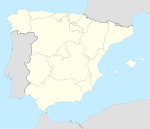Alguazas
| Alguazas municipality | ||
|---|---|---|
 Alguazas - Church of San Onofre
|
||
| coat of arms | Map of Spain | |

|
|
|
| Basic data | ||
| Autonomous Community : | Murcia | |
| Province : | Murcia | |
| Comarca : | Vega Media del Segura | |
| Coordinates | 38 ° 3 ′ N , 1 ° 14 ′ W | |
| Height : | 85 msnm | |
| Area : | 23.74 km² | |
| Residents : | 9,638 (Jan 1, 2019) | |
| Population density : | 405.98 inhabitants / km² | |
| Postal code : | 30560 | |
| Municipality number ( INE ): | 30007 | |
| administration | ||
| Website : | Alguazas | |
Alguazas is a small town in southern Spain and a municipality ( municipio ) consisting of several villages and hamlets with 9,638 inhabitants (as of January 1, 2019) in the north of the province of Murcia in the autonomous region of Murcia of the same name .
location
The small town of Alguazas is located between the Río Mula and the Río Segura approx. 25 km (driving distance) northwest of the city of Murcia and approx. 40 km (as the crow flies) from the Mediterranean Sea at an altitude of 80 to 90 m above sea level. d. The climate in winter is temperate, in summer it is warm to hot; the low amounts of precipitation (approx. 300 mm / year) fall - with the exception of the almost rainless summer months - distributed throughout the year.
Population development
| year | 1857 | 1900 | 1950 | 2000 | 2016 |
| Residents | 1.963 | 2,559 | 4,160 | 7,052 | 9,613 |
The continuous increase in population is mainly due to the ongoing immigration from the rural area.
economy
Alguazas is in the rural area of the province of Murcia; mainly fruit trees were planted. Small traders, craftsmen and service companies of all kinds have settled in the village. In 2004 a business park (Polígono Industrial de Las Pullas) was established.
history
The oldest finds ( stone axes , arrowheads ), which testify to the presence of humans in the region, date back to the Neolithic . Iberian , Roman and Visigoth finds are missing. In the years after 711 the area was overrun by the Moors ; the place was called Al-Waza . After the recapture ( reconquista ) of the region by Castilian troops under Alfonso X in 1243, the quasi-independent was Taifa Kingdom of Murcia in a Christian kingdom converted, which, however closely with the Crown of Castile was intertwined, but it came in the years 1296 until 1304 temporarily under Aragonese rule .
Attractions
- The St. Iglesia de San Onofre , consecrated to Onophrius , has a long building history that spans the period from the 16th to the beginning of the 19th century. The styles are correspondingly diverse, ranging from the Mudéjar style to the Renaissance and Baroque to classicism . The oldest parts are made of bricks brick bell tower and the nave . The elevation and widening of the crossing area, including the dome, did not emerge until the 1890s; an apse was not built. The demolition and rebuilding of the nave were also planned, but construction work was stopped in 1801. The nave with its side chapels and the wooden roof structure , the center of which is formed by an artesonado flat ceiling, offers a very unusual spatial impression .
- Surroundings
- The Torre de los Moros , which was probably not built in the open field as a watchtower ( atalaya ) or as a protective tower in the event of possible Moorish attacks in the rammed earth technique , has brick vaults inside. However, some researchers date the original building to the time of the Almohads . The building now serves as a lookout tower for tourists; Inside the building there is now a small museum with objects from everyday life in earlier centuries.
Web links
Individual evidence
- ↑ Cifras oficiales de población resultantes de la revisión del Padrón municipal a 1 de enero . Population statistics from the Instituto Nacional de Estadística (population update).
- ↑ Alguazas - Map with altitude information
- ↑ Alguazas - climate tables
- ↑ Alguazas - Population Development
- ↑ Alguazas - Economy
- ↑ Alguazas - History
- ↑ Alguazas - San Onofre
- ↑ Alguazas - Torre de los Moros


